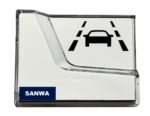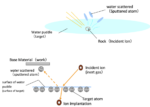Gain an Aesthetic, Functional Edge with Sputter Coating
January 17, 2024 • Posted in In Mold Labeling
If you’re looking to achieve a metallic or chrome-like look for your custom plastic part, an advanced coating may be the right choice for you. Namely, sputter coating can help your product stand out for its aesthetic appeal and longevity. This type of coating is commonly chosen for decorative parts based on its high hardness, wear resistance, and cosmetic edge.
With decades of sputter coating experience, our Sanwa team can walk you through the best methods and outcomes for your high-end part. We’ve also put together some information here about the process, the advantages, and example uses — so you can refer to helpful information about sputter coating when you’re conceptualizing or designing your next project.

The Sputter Coating Process
This is the most technical piece of the sputter coating discussion, so we’ll do our best to make the ins and outs of the process understandable:
Sputter coating is a physical vapor deposition (PVD) process used to apply a thin coating onto a target substrate (your product’s part). The process occurs in a chamber where the target surface can be rotated as the sputter coating is applied.
A sputtering gas, such as argon, collides ions with the target substrate and its atoms are blown away — this is called sputter evaporation. The sputtered atoms repelled by the argon ions are electrically neutral and fly toward a base material placed opposite the target.
Just like when you throw a stone into a puddle, the water splashes out — so the atoms that make up the target are thrown away (or splashed away) and replaced with metallic or alloy ions.

Advantages of Sputter Coating
Sputter coating offers strong adhesiveness, long life span, and the ability to pull target material from most metals and alloys. This means a plastic-printed part can achieve a truly metalized look for many years to come. Other advantages include:
Uniformity
Thickness control
Good adhesion
Versatility
Ability to use with 3D printed materials (around corners and edges)
Another benefit of sputter coating is environmental. Replacing other wet electrodeposition processes has been widely encouraged in the EU due to issues with waste management. With magnetron sputter coating, the hexavalent chromium (a known human carcinogen) emissions during the process are greatly reduced.
Where to Find Sputter Coating Parts
If you’re in your car or home, odds are you’ll be able to spot a sputter coated part fairly easily. In automobiles, you’ll see sputter coating used on knobs, switches, decorated trim, handles, and emblems. Look for parts with a shiny or metallic sheen, and you may indeed spot a sputter coated part nearby.
In the home and office, you’ll find sputter coating on common household appliances and fixtures:
Appliance trims and handles
Portable heaters and fans
Smart thermostats
Light fixtures
Remote control buttons
Decorative trim on a TV or monitor
Even water bottle push buttons!

Call to learn more
Sputter coating can be used in the automotive, aerospace, appliance or medical supply industries. We also offer physical vapor deposition (PVD), which is a similar process offered at a typically lower cost. All types of coating come with their own benefits and challenges, and should be selected based on your unique requirements.
When you’re looking to create decorative emblems, badges or ornaments, we can help with selecting the method that’s right for you. We’ll discuss your goals, applications, budget and the larger-picture project to make sure we can recommend the best-fit coating method. If you have questions or ideas, contact our Sanwa team. We specialize in delivering coating solutions that our clients and their customers rave about.
